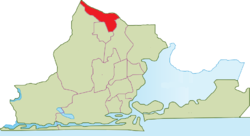Ifako-Ijaiye
Ifako-Ijaiye | |
|---|---|
Local Government Area & City | |
 Location in Lagos | |
| Coordinates: 06°41′05″N 03°17′20″E / 6.68472°N 3.28889°E | |
| Country | |
| State | Lagos |
| Created | October 1, 1996 |
| Government | |
| • Executive Chairman | Prince Usman Akanbi Hamzat |
| • House of Representatives Member | Adeyemi Benjamin Olabinjo |
| Area | |
• Total | 17 sq mi (43 km2) |
| Population (2022)[1] | |
• Total | 633,200 |
| • Density | 38,000/sq mi (15,000/km2) |
| Time zone | UTC+1 (WAT) |
 | |
Ifako-Ijaiye is a city and local government area in Lagos, Nigeria. It has a land area of 43 square kilometers (17 sq mi) and had a population of 427,878 people in 2006.
History
[edit]The Ifako-Ijaiye Local Government was created along with 183 other local governments on October 1, 1996, by General Sani Abacha, the then military head of state. It was carved out of Agege Local Government, with headquarters in Ifako, and predominantly populated by the Egba Yoruba people . [2][3]
Ifako-Ijaiye Local Government is a border suburb town as it shares border with Ogun State. The major settlements are Ogba-Ijaiye, Ifako, Oke-Ira, Iju-Ishaga, Obawole, Iju-Ogundimu, Fagba, Agege Pen Cinema, Ojokoro[4] among others.
The past leaders of the Local Government are: Engr. Richard Akinpelu (late), Alh. Ma'rufdeen Adeola Adefolabi (late), Hon. Demola Doherty, Hon. (Apostle) Oloruntoba Oke (2011-2014), Hon Akinwunmi Nurudeen Olaitan (2014-2016), Hon Babatunde I.Q. Rajh-Label (2016-2017).
The Former Governor of Lagos State, Mr. Akinwunmi Ambode, appointed Babatunde I.Q. Rajh-Label as Sole Administrator of the Local Government in June 2016. The election was held on July 22, 2017, throughout the 20 Local Government Areas and 37 Local Council Development Areas of Lagos State. Hon (Apostle) Oloruntoba Oke was elected and sworn in as the Executive Chairman for a second term by the former State Governor, His Excellency, Gov. Akinwunmi Ambode.
The Local Government is at present being led by Hon. (Prince) Usman Akanbi Hamzat as the Executive Chairman, after a local government election held in July 2021.
Transport
[edit]The city is served by Agbado station,[5] located in the Local Council of Agbado-Oke Odo[6] and part of the Lagos Rail Mass Transit project.
Current Executives
[edit]Prince Usman Akanbi Hamzat - Executive Chairman
Hon. Mrs. Oluwatoyin Awoniyi Akerele - Vice Chairman
Past Chairman & Sole Administrators of Ifako Ijaiye Local Government
[edit]Engineer Adeoye Ogundipe - Acting Chairman - October 1996
Hon. Aremu Akindele - 1st Executive Chairman - March 1997
Hon. Ademola Taiwo - Sole Administrator - June 1998
Hon. Adeola Adefolabi - 2nd Executive Chairman - June 1998
Hon. Babatunde Odele - Executive Secretary - June 2002
Hon. Dr. Elijah Olu Adewale - Executive Secretary - April 2003
Hon. Richard A.A. Akinpelu - 3rd Executive Chairman - April 2004
Hon. Muzemil Olajide Tairu - Sole Administrator - August 2008
Hon. Demola Doherty - 4th Executive Chairman - October 2009
Apostle (Dr.) Oloruntoba Oke - 5th Executive Chairman - October 2011
Hon. Adeleye Rotimi - Executive Secretary - January 2015
Hon. B.I.Q. Rajh Label - Sole Administrator - June 2016
Sole Administrator's Activities So Far
[edit]- Commencement of The Local Government Headquarters Building in Ifako
- Handed Over Landed Property For Primary School Development In Obawole
- Commemoration of 20th Anniversary of The Local Government's Existence
- Free Computer Training Programme For Primary School Pupils
- Rehabilitation of Bore Hole Water for School Students
- Free Skill Acquisition Training Programme for Residents
- Routine Peace And Security Meeting
- Routine Management Meeting
- Monthly Environmental Sanitation Inspection Exercise
- Grading of Local Roads
- Training of Staff amongst others
Photo Gallery
[edit]-
Agbado-Oke-Odo Local Council
References
[edit]- ^ "Lagos State: Subdivisions". www.citypopulation.de. Retrieved 2024-02-05.
- ^ Fenske, James (1830). Land abundance and economic institutions: Egba land and slavery. The Economic History Review. p. 65. Retrieved July 31, 2024.
- ^ Ogunhemi, Gabriel Ogundeji (1982). Counting the Camels: The Economics of Transportation in PreIndustrial Nigeria. Nok Publishers. p. 64. Retrieved July 31, 2024.
- ^ "OJOKORO LCDA SEASON GREETINGS". Media 57. 2021-12-25. Retrieved 2022-11-10.
- ^ "Agbado railway station" (Map). Google Maps.
- ^ "Agbado-Oke Odo Local Council Development Area". Archived from the original on 2018-10-12. Retrieved 2017-05-22.


